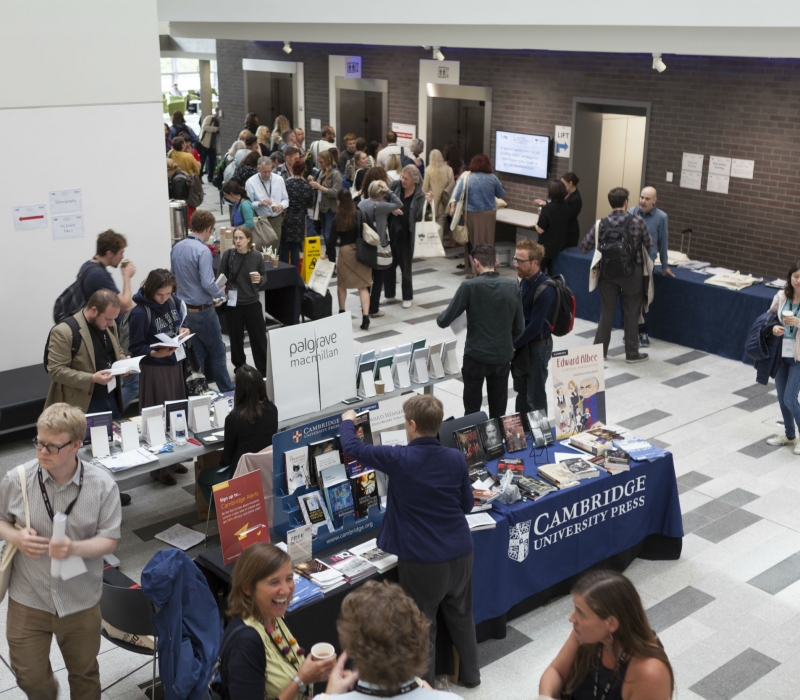FIND OUT MORE
Postgraduate Essay Prize
The TaPRA Postgraduate Essay Prize aims to recognise and support excellent postgraduate scholars within theatre and performance disciplines. The prize includes the opportunity to be mentored towards publication in a major academic journal. All entrants will receive peer feedback on their submission. We also offer coaching to help authors develop their submission.
All postgraduates registered for postgraduate study at a higher education institution, anywhere in the world, are eligible. PhD students can enter at any point in their candidature up to the conferment of their doctorate. We accept submissions from master’s students who have completed their studies during the period when the competition is open.
TaPRA aims to address the historic under-representation of black and global majority heritage scholars in the field of theatre and performance studies, and to expand its international outlook to include scholars from across the globe and those from or living in the Global South. We particularly welcome entries from those constituencies for this prize.
The TaPRA Postgraduate Essay Prize is generously supported by the following journals:
Studies in Theatre and Performance
Contemporary Theatre Review
International Journal of Performance Arts & Digital Media (IJPADM)
Research in Drama & Education (RiDE)
Theatre, Dance and Performance Training
and generously sponsored by the following publishers:
Methuen Drama
Palgrave
Manchester University Press
Guidelines for submission
See The TaPRA Postgraduate Essay Prize page for submission details and judging criteria.
Call for coaches for TaPRA PGR essays
To support and encourage postgraduate students to enter our TaPRA Postgraduate Essay Prize we are looking for coaches – experienced researchers and authors in the field of theatre and performance who can advise first-time authors on developing their work for journal publication.
Coaches are asked to read a draft essay and meet with the author online (once) to help the author assess the strengths of the work and identify possible areas for improvement. Coaching takes place between October and December. If you would like to be a coach for the 2023 competition, please email j.e.mckinney@leeds.ac.uk by Friday 23 September 2022.


PRIZES
2023
2023 WINNER
Sebastian Mylly
“Staging the Trans Body and Navigating the Cis Gaze: Transgender Performance and the Politics of Spectacle”
The panel deeply appreciated this insightful and urgent writing about, with, and for trans* bodies. The essay provides an engaging and thorough overview of key works by Cassils, whose work merits wider attention within theatre and performance studies, and applies a nuanced analytical framework. But more than this, it connects this work to the broader experiences of trans* persons, reflected here in a breadth of kinds of voices and writings that are cited, not least the author’s own lived experience. This sensitivity to not just the spectacular body, as object of analysis, but the lived body runs through this work.
SHORTLISTED
Debanjali Biswas
“En/k/counter: reflections on violence and performance in India”
Mia Georgina Hull
“Blackface as Exorcism: Using Aimé Césaire to Unlock Blackface in An Octoroon and Tight Right White“
2020
Sky Herington
PhD candidate, University of Warwick, UK
‘Grotesque Bodies and Subversive Healing: The Politics of the Belly in Two Plays by Sony Labou Tansi’
Clio Unger
‘Share Your Work: Lola Arias’s Lecture Performance Series and the Artistic Cognitariat of the Global Pandemic’
2019
Anika Marschall
PhD candidate at the University of Glasgow, for her essay ‘Between Tokyo and Frankfurt: About Akira Takayama’s ‘Theatre 2.0’, migratory encounters and urban solidarity in the contemporary city’.
The judges highlighted that: ‘This article is a useful account of the work of Takayama and it surveyed and integrated relevant material in a deft and illuminating way. It demonstrates theoretical sophistication and the structure of the paper is very elegant and nuanced. ‘
Rachel Walker
PhD Candidate at the University of Sheffield, for her essay ‘Maximum value to the community’: the permanent company of the Victoria Theatre, Stoke-on-Trent.’
2018
Charlotte Armstrong
PhD candidate at University of York for her essay ‘Representations of The Degenerate Condition from Source to Stage: Disability and Morality in Franz Schreker’s Die Gezeichneten’.
The judges highlighted that:
‘The essay represents a comprehensive close analysis of the production in question. There is an excellently constructed narrative, which is accompanied by insightful analysis and supported by a carefully chosen and judicious choice of reference materials. Appropriate inclusion of production visuals supports the argument. The analysis is complex and the author also has a well-developed critical eye. The critical voice is well honed to the work of the director/the reception of the Opera and a critique of this as a cultural work. ‘
Poppy Spowage
for ‘East African Soul Train: Producing Performance and Creating Atmosphere’.
2017
Catherine Sloan
PhD candidate at Royal Central School of Speech and Drama, for her essay ‘Creating Spaces of Potentiality: Towards an Alternative Theoretical Framework for Applied Theatre Practice with People in Recovery From Addiction’.
Professor Tompkins remarks that ‘This example of applied theatre is practitioner-led and seeks to build on the applied theatre theory ideas that through Hughes and Nicholson have developed. It also seeks to develop a better understanding of affect. It is well-contextualised and understands the potential limitations of applied theatre and is trying to do ensure that its practice is productive. It begins to build a good study of spatiality as well.’
Kirsty Surgey
WRoCAH PhD Candidate, University of Sheffield, for her essay ‘A study of three works: What happens when Bobby Baker plays?’
Professor Tompkins felt that ‘ This essay was a delight to read: the author clearly loves the work of Baker and the sense of play that she performs. It clearly sets out a problem (play in the plays of Bobbie Baker), sticks to it, and ‘solves’ it.’
Information and Link to published essay:
When Bobby Baker works, she plays: a study of Drawing on a Mother’s Experience and Table Occasion No19′, Studies in Theatre and Performance, 41:2 (2021), 212-225 <DOI:10.1080/14682761.2020.
2016
Hannah Greenstreet
Master’s student at Jesus College, University of Oxford, for her essay:
Narrative dysfunction in The Walworth Farce by Enda Walsh and On Raftery’s Hill by Marina Carr
Studies in Theatre and Performance
Professor Tompkins remarks that ‘This paper provides a novel approach to naturalism and to the work of Enda Walsh and Marina Carr via the trope of storytelling. While naturalism may seem to be well-worked over territory, this paper encourages us to re-evaluate this genre. It also produces a detailed, rewarding reading of the plays. The structure of the paper is very elegant and nuanced, helping to contribute to a good overall understanding of the contemporary relevance of these writers. This paper tells its “story” very well.’
Becca Savory Fuller
PhD candidate in Drama in the University of Exeter/NIAS joint-doctoral programme, for her essay ‘“Flash mob Mumbai”: performing a “politics of forgetting” in the semi-public spaces of globalising India’.
Professor Tompkins felt that ‘This paper analyses how we might think about understanding ‘social media performance’ in the highly-charged city context of Mumbai, a city where attempts to use social media have in the past backfired. The author situates the recent tensions of this geographical/social context well and intriguingly looks to both the potentials and the ironies raised by social media performance. The paper has relevance to contemporary performance informed by technology well beyond its exploration in Mumbai.’
2015
Claire Hampton
Brunel University for her article on:
#nomakeupselfies: the face of hashtag slacktivism
Article was already accepted for Networking Knowledge: Journal of the MeCCSA Postgraduate Network
Jessica McCormack
Bristol: ‘Choreography as a Translation Process in the Verbatim/Documentary Dance-Theatre Genre’
Helen Gush
QMUL/V&A: ‘Lurking in the Shadows of the Ballroom: Things and the Archive’.
2014
Catherine Love
By the Book: Adaptation, Work, and Elevator Repair Service’s Gatz
Contemporary Theatre Review
Adelina Ong
The path is place: skateboarding, graffiti and performances of place
Research in Drama Education
Bryony White
2013
Charlotte Bell
Contemporary Theatre Review
Deborah Leveroy
Locating dyslexic performance: text, identity and creativity
Research in Drama Education: The Journal of Applied Theatre and Performance
2012
2011
Adam Alston
Damocles and the Plucked: Audience Participation and Risk in Half Cut
Contemporary Theatre Review
Geraldine Brodie
Contemporary Theatre Review
2010
Marcus Cheng ChyeTan
“Every Situation Has Its Rhythm”: Acoustic Mimesis and Sonic Exoticism in Tambours Sur La Digue
Contemporary Theatre Review
Aoife McGrath
Contemporary Theatre Review
2009
Theron Schmidt
Unsettling Representation: Monuments, Theatre, and Relational Space
Contemporary Theatre Review
Ryan Hartigan
Performance Research
2008
Catherine Curtin
Contemporary Theatre Review
MAKE AN
Election Nomination
Only current TaPRA members can submit nominations for our elections. Each nomination requires a seconder, who must also be a current member.
TaPRA 2025 at Warwick
Our 2025 conference will be hosted in partnership with the University of Warwick, 27-29 August 2025
TaPRA 2025 at Warwick
Our 2024 conference will be hosted in partnership with the University of Warwick.

